2023 Winners
Grand Prize: Upper Division Thesis
|
Janick Gold Advisor: Terri DeYoung Project Title: Marx and Engels on the Procrustean Bed: Translating The Communist Manifesto in 1970s Beirut Description: Within three years in the early 1970s, two new Arabic translations of The Communist Manifesto appeared in Beirut. The translations were part of a much larger project undertaken by the city’s publishing houses of introducing Marxist modes of analysis to the Arabic public sphere. The result, Ahmad Agbaria writes, was the appearance “of a wholly ‘new Marx.’” Who was this “new Marx”? He represents, I argue, not only a break from the “old Marxes”—of the Soviet and European types—but the renunciation of an “original” Marx altogether. This new Marx was constituted by a “double anchoring” of oppositional or subversive thought developed outside of the Arab world and its mediation with new “Arabic languages of the present.” Finally, while he was perhaps a common dream of the New Arab Left, he was not an uncontested figure. His translators approached him with such urgency because they recognized the stakes involved. |
|
 |
Kaitlyn Laibe Advisor: Katherine Beckett Project Title: Hopeful: An examination of incarcerated people's experience learning of unexpected early release Description: In the wake of federal decisions challenging the constitutionality of life sentences, Washington State enacted a variety of legal pathways towards early release. This study explores how learning of the possibility of early release affected incarcerated individuals who previously did not expect to be released from prison. Qualitative interview data from 12 individuals who secured early release from Washington State prisons resulted in three key findings. First, for every participant, learning of early release created hope. Second, the hope that early release generates is tempered by institutional factors outside of the individual’s control, such as correctional staff intentionally administering infractions to disqualify individuals from early release process(es). Thirdly, although tempered hope results in a “hope for the best, expect the worst” mentality, hope positively impacts an individual’s trajectory, engagement, and behavior in prison. This research illuminates the importance of creating realistic early release mechanisms and allowing hope to flourish. |
 |
Teng-Jui Lin Advisor: Elizabeth Nance Project Title: Quantifying Microglia Morphological Response to Injury and Treatment Across Species with Unsupervised Machine Learning Description: Microglia, the brain’s immune cells, change morphology in response to neuroinflammation and therapeutics. However, we lack robust and high-throughput software for quantitative morphological analysis to understand microglia’s reactivity to neuroinflammation. I optimized an image-based morphological analysis method based on unsupervised machine learning in Python to cluster microglia into shape modes. I applied the method to images from ex vivo rat and ferret brain slice models that induce neuroinflammation. The determined shape modes capture regional variation and injury and treatment response of microglia morphology in both animal models. By quantifying and linking microglia’s morphological response to neuroinflammation and functional states across conditions, our method enables non-destructive assessment of microglial reactivity to inflammation and therapeutic performance across disease models. |
Grand Prize: Upper Division Non-Thesis
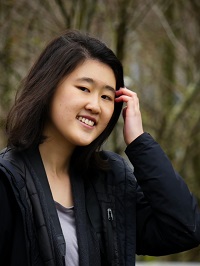 |
Julia Park Advisor: Juliet Shields Project Title: Scars, Silence, and Speculations: The Communication of Pain in Narratives of Enslaved Women Description: My research paper, “Scars, Silence, and Speculations: The Communication of Pain in Narratives of Enslaved Women,” analyzes the rhetorical strategies used by two groups of female survivors: African American and African British women forced into the transatlantic slave trade, and Korean “comfort women” sexually exploited by the Japanese imperial military preceding and during WWII. I examine literature by women authors such as Mary Prince and Harriet Jacobs, as well as translated and transcribed oral history interviews with Korean women, to uncover something deeper about how these women translated pain, trauma, and injustice for their audience. |
 |
Nadia Matveeva Advisor: Christina Ma Project Title: The Bidirectional Relationship Between Neurogenesis and Depression Description: The intersection between neurogenesis and depression have recently become a popular topic in the neuroscience community. Current research suggests that there is a bi-directional relationship between the two. Depression is proven to decrease the volume of the hippocampus, and research suggests that this is because of slowed neurogenesis. During depression, gene expression that regulates neurogenesis is disrupted as the brain activates an inflammatory-immune response. Furthermore, studies suggest that decreased neurogenesis can cause depression, and investigations into antidepressants have found that they often upregulate neurogenesis or downregulate the immune response in the brain. The fields of neuroscience and psychology have focused on these two relationships. It is so far unknown which side of the relationship is more dominant, but current research is valuable to designing further treatment for depression. |
 |
Indra Behar Advisor: Jenny Stern Project Title: Understanding Extent of Pathogen Risk Associated with Walrus (Odobenus rosmarus) Haul-Out Behavior Description: Due to climate change, walruses are engaging in mass haul-outs much more frequently and in much larger and denser proportions than before. My project is a holistic assessment of the infectious disease risks and implications associated with this change in behavior, looking the factors that may influence disease transmission amongst hauled-out walruses and what the risks are for humans that interact with the walruses. |
Grand Prize: Lower Division
|
|
Rachel Lundeen Advisor: Brigitte Prutti Project Title: “Ach, wenn ich nur die richtigen Worte finden könnte!” Sprache, Repräsentation und Selbstreflexivität in den Reisetexten Annemarie Schwarzenbachs, 1939-1940. [“Oh, if Only I Could Find the Right Words!” Language, Representation, and Self-Reflexivity in the Travel Texts of Annemarie Schwarzenbach, 1939-1940] Description: In 1939, the long-overlooked Swiss author Annemarie Schwarzenbach (1908-1942) traveled from Switzerland to Afghanistan with the athlete and adventurer Ella Maillart, a journey which both women documented through diverse media, including texts, photographs, and letters. The purpose of this research is to analyze the role of language, representation, and literary self-reflexivity in Schwarzenbach’s Afghanistan texts, concentrating on the collections "Die vierzig Säulen der Erinnerung" [The Forty Pillars of Memory] and "Alle Wege sind offen" [All the Roads are Open]. First, I situate my literary analysis by describing Schwarzenbach’s travels, her texts’ publication history, and her writing philosophy. Drawing on theories of travel literature, the aesthetic of the sublime, and literary self-reflexivity, I then examine the strategies Schwarzenbach employs to explore and overcome the challenges of representation, focusing on her construction of the sublime, the senses, and the act of writing. |
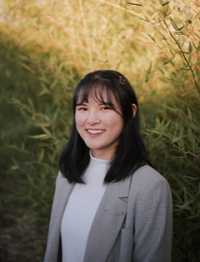 |
Fiona Wang Advisor: Christina Ma Project Title: Cystic Fibrosis Gene Therapy: A Treatment Worth Considering? Description: In recent years, gene therapy has emerged as a novel form of treatment for many genetic illnesses, one of the most notable being cystic fibrosis (CF). Gene therapy can be used to deliver a correct, non-mutated copy of the cystic fibrosis transmembrane conductance regulator (CFTR) gene into the body via a virus cell to replace the mutated copy of the CFTR gene in CF patients, which causes the illness. If done correctly, gene therapy can offer a non-invasive, versatile treatment that can cure cystic fibrosis at the source (or in other words, at the mutation). However, the viral vectors used to transport the CFTR gene can cause fatal inflammation and infection, along with the vectors attacking the wrong tissue. These two deadly side effects in conjunction with the hundreds of thousands dollar price tag make CF gene therapy an ineffective form of treatment. |
Honorable Mention: Upper Division Thesis
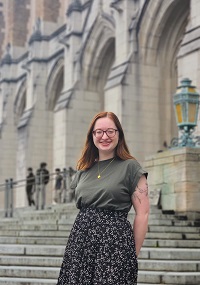 |
Sarah McDaniel Advisor: Margaret O'Mara Project Title: In the Shadow of the Goddess: The Legacy of Sir Arthur Evans and the Interpretation of Minoan Religion Description: The work of British archaeologist Sir Arthur Evans (1851-1941) has left a lasting impact on modern conceptions of the Minoan civilization. Recent scholarship however has begun to scrutinize the conceptual frameworks and intellectual agendas that drove his work, arguing his interpretations were shaped by his goal of asserting Minoan Crete as ‘European.’ This paper reveals the legacy of Evans’s work through a survey of the scholarship as well as introductory and public works to provide insight into the ways his work continues to impact modern conceptions. Exploring Evans’s background and writings reveals the Eurocentric and imperial narratives that influence his work, and a survey of the historiography in the century that follows reveals the continued legacy of his narratives. Furthermore, an examination of introductory texts and sources, such as those utilized in education and spaces of public history, illuminates the ways sources perpetuate Evans’s narratives and frameworks. |
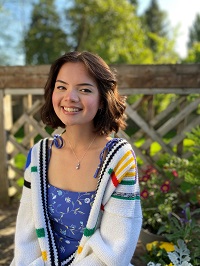 |
Melinda Whalen Advisor: Glennys Young Project Title: Motherhood, Love, and the Self in the Soviet Novel: Religious Reconstructions of Female Young Adult Identity in Postwar Novels (1945-1990) Description: "This project uses the lens of female young adults in novels to examine the war’s lingering impact and the destabilization of socialist identity conceptions during the postwar period. It pays special attention to women’s identity as explored through their engagement with religious conceptualizations of gender and the family unit. These issues of identity are examined through the young female protagonists in the novels Picture in the Teacup (1986) by Dina Kalinovskaya and Redemption (1984) by Friedrich Gorenstein. Both Kalinovskaya’s Serafima and Gorenstein’s Sashenka confront religious and socialist constructions of female identity during their constant movements between the child and the adult, the woman and the non-woman, and the perceived roles of the mother. This paper analyzes the linguistic nuances in both the translated English and original Russian versions of the texts, emphasizing how these authors used religious-coded language and constructs to implicitly critique the Soviet system and socialist culture." |
Honorable Mention: Upper Division Non-Thesis
|
Jolee Thirtyacre Advisor: Erica Escajeda Project Title: A Neglected Arctic Species: The Role and Impact of Jellyfish in the Arctic Description: Jellyfish are a widely recognized marine species, but there is a lack of scientific research on them overall. The jellyfish in the Arctic have been researched even less than jellyfish in other ecosystems. With the continual changes occurring in the Arctic due to climate change, there is a need for understanding how all the species in this environment interact with one another as well as how they are responding to these environmental changes. If we are to understand how the Arctic is changing and the impacts warming is having on the species that live there, we need to understand jellyfish involvement in the ecosystem. First, we will look at their interactions with other species in the Arctic food web and their interactions with indigenous people. Once we understand this, we will look at the responses Arctic jellyfish are having to the warming Arctic waters and present gaps in our knowledge. |
|
 |
Molly Philip Advisor: Jenny Stern Project Title: Climate Change Impacts on Greenland Sharks (Somniosus microcephalus) Description: An in-depth exploration on the impact of climate change and human activity on Greenland sharks. In my paper, I discuss the diet, habitat, and behaviors of Greenland sharks and how they may change in the future due to anthropogenic factors. I synthesize a wide variety of information to draw conclusions on the subjects discussed, exploring in detail the functionality and fragility of marine food webs among other topics. My paper places an emphasis on conservation of marine life, and advocates the importance of mitigating climate change, chemical pollution, and human activity that will severely impact the Arctic and its ecosystem. |
Honorable Mention: Lower Division
 |
Alice Nguyen Advisor: Sarah Ghasedi Project Title: Urban Planning of U-District Description: The urban planning development of the U-District has been under construction for a few years. I hear that both alumni and current UW students are having conversations about the changes to the neighborhood, even though this should already be expected. This is a topic should be brought to light because the decisions made to the development of U-District will affect students’ experience during and after their time at UW and living in the U-District. Acknowledging the development is one way to make a change to both the U-District and UW community as sharing knowledge about this topic in those conversations can bring critique to the changes. If more UW students from different backgrounds and perspectives can participate, then U-District as a whole can be built for the residents by the residents. |
 |
Visakha Mukkamala Advisor: Sanjana Ramesh Project Title: Hindu Mythology and the Caste System Description: I explore the intersectionality of Hindu mythology, the caste system, and colorism. Although the caste system is supposedly abolished, it still plays a large role in India today as notions that have originated from it are still in place today, such as colorism. My goal is to analyze that though Hindu mythology is not inherently colorist, the modern juxtaposition of Hindu Gods and Monsters in literature and art reinforces detrimental prejudice that is passed down through generations of families. |
Population Health Award
 |
Kaitlyn Laibe Advisor: Katherine Beckett Project Title: Hopeful: An examination of incarcerated people's experience learning of unexpected early release Description: In the wake of federal decisions challenging the constitutionality of life sentences, Washington State enacted a variety of legal pathways towards early release. This study explores how learning of the possibility of early release affected incarcerated individuals who previously did not expect to be released from prison. Qualitative interview data from 12 individuals who secured early release from Washington State prisons resulted in three key findings. First, for every participant, learning of early release created hope. Second, the hope that early release generates is tempered by institutional factors outside of the individual’s control, such as correctional staff intentionally administering infractions to disqualify individuals from early release process(es). Thirdly, although tempered hope results in a “hope for the best, expect the worst” mentality, hope positively impacts an individual’s trajectory, engagement, and behavior in prison. This research illuminates the importance of creating realistic early release mechanisms and allowing hope to flourish. |
 |
Carolina de Barros Antonucci Advisor: Misha Mariam Project Title: Motivation in Non-Profit Organization Workers Description: Our topic of evaluating motivation and commitment in non-profit organizations relates to population health because we examine the mental health and general well-being of workers following the pandemic. Many non-profit workers do not receive attractive salaries or in some cases, any salary at all. The lack of adequate financial compensation despite significant work demands can contribute to employee stress and burnout, which can have a negative impact on mental health. Therefore, it's crucial for non-profit organizations to provide a supportive work environment and address the factors that adversely affect mental health. Our study focuses on the effects of the pandemic-related pressures on employee behaviors and uncovers that while several forms of negative behaviors remain unchanged, positive behaviors increase. Data from surveys and interviews shed light on the contrasting effects of these negative behaviors such as ostracizing coworkers, and positive behaviors such as helping coworkers with the mental health outcomes of employees. We discuss the broad impact of a supportive workplace culture on employee mental health, which can further foster employee motivation, commitment, and general well-being. These findings highlight the importance of understanding the impact of the work environment on employee well-being and the need for organizations to address these factors in order to promote a positive and supportive work environment for their workforce. |
 |
Rahoul Banerjee Ghosh Advisor: LaShawnDa Pittman Project Title: Drowning Out The Rest: The West’s Dominance of the Climate Crisis Description: My project was a literature review prepared for HONOR 231: "Western Civilization” and Global Public Policy about inequity in responsibility for, consequences from, and responses to climate change between the developed and developing world, described as the "West" and the "Rest". The three themes discussed are the sharp mismatch in greenhouse gas emissions and the burden of climate change effects observed between these worlds; the historical and current theme of exploitation of “the Rest” by “the West” in ways such as colonialism and resource extraction that has organized the world into regions prepared to deal with environmental disasters and those that are not; and climate imperialism, enabling Western countries to utilize wealth and power, acquired through economies built on fossil fuels and the exploitation of poorer regions, to shape climate policy in their favor, and escape responsibility for their actions. |
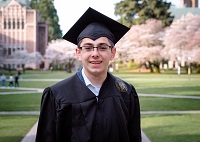 |
Hayden Goldberg Advisor: Amanda Friz Project Title: The Rhetorical Implications of Metaphorical Entailments and Terministic Screens: An Analysis of the British Press’ Coverage of the COVID-19 Pandemic Description: This paper analyzes the rhetoric of British press reports on the COVID-19 pandemic. I combine terministic screens, metaphors, and metaphorical entailments to explicate a new theory on the impacts of metaphor. I argue that the vehicle of metaphor functions as a terministic screen and the impacts can be understood using metaphorical entailments. Under my theory, these entailments can be plotted onto an XY plane and compared with each other. Using this, I analyze the metaphors used by four British newspapers to assess the role of the press in shaping people’s perceptions of the pandemic and its consequences. I identify metaphors that (de)construct borders in order to denote an “other”; economic metaphors mixed with war and natural disaster metaphors to frame the pandemic as an economic, not health, problem; and war metaphors that rhetorically construct plastics and bodyweight as things that should be understood in terms of war. |
